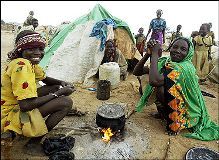Security Council extends UN political mission in Sudan
By NICK WADHAMS, Associated Press Writer
UNITED NATIONS, Mar 11, 2005 (AP) — The U.N. Security Council extended the U.N. political mission in Sudan for a week as members inched toward agreement on a resolution on a U.N. peacekeeping force, sanctions and punishing war criminals.
 U.S. Deputy Ambassador Stuart Holliday said after the unanimous vote that he expected a U.S.-drafted resolution would be ready by early next week but that there was not consensus yet. The council still disagrees on how to best hold suspects accountable and how far to push sanctions and an arms embargo.
U.S. Deputy Ambassador Stuart Holliday said after the unanimous vote that he expected a U.S.-drafted resolution would be ready by early next week but that there was not consensus yet. The council still disagrees on how to best hold suspects accountable and how far to push sanctions and an arms embargo.
“We always try to accommodate our council colleagues, but there’s a certain point where you have to stand to make sure that the resolution retains its effectiveness,” Holliday said Thursday.
Council experts have been meeting for weeks trying to bridge differences over sanctions and the court to try those accused of crimes. But diplomats say a wide gap remains.
The latest U.S. draft resolution would establish a broader U.N. mission and authorize a 10,000-strong U.N. peacekeeping force to monitor a peace accord ending a 21-year civil war between the government and southern rebels. It would also try to reinforce efforts by an African Union force to foster peace in the western Darfur region.
The U.S. proposal calls for a travel ban and asset freeze on those who impede the peace process, threaten stability in Darfur, violate international humanitarian or human rights law, or are responsible for military overflights.
Holliday said the resolution would also demand that Sudan’s government stop all offensive military flights. U.N. officials have said Sudanese planes and helicopters continue to attack villages and intimidate people even though Khartoum had ordered the flights to stop.
Holliday did not say what the enforcement mechanism would be, but he said the demand for the halt in flights would be linked to other measures and the African Union would be asked to share information about flights.
An International Commission of Inquiry recently concluded that crimes against humanity — but not genocide — probably occurred in Darfur.
The commission recommended that those responsible be prosecuted by the International Criminal Court, the world’s first permanent war crimes tribunal, and drew up a secret list of top suspects. But the United States vehemently opposes the International Court and wants war crimes suspects to be tried by a new tribunal in Arusha, Tanzania. This proposal, however, has received little support.
China and Algeria also oppose allowing the court to try alleged perpetrators, saying trials should be conducted in Sudan with international support.
